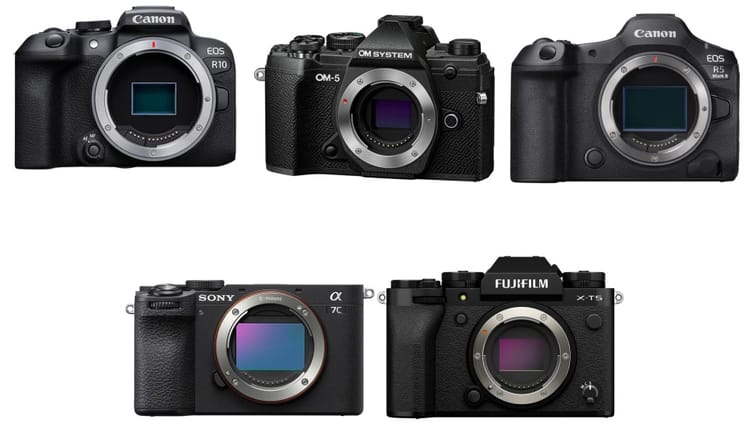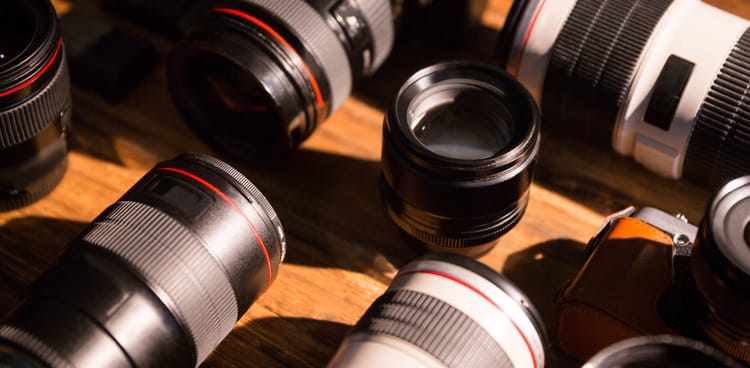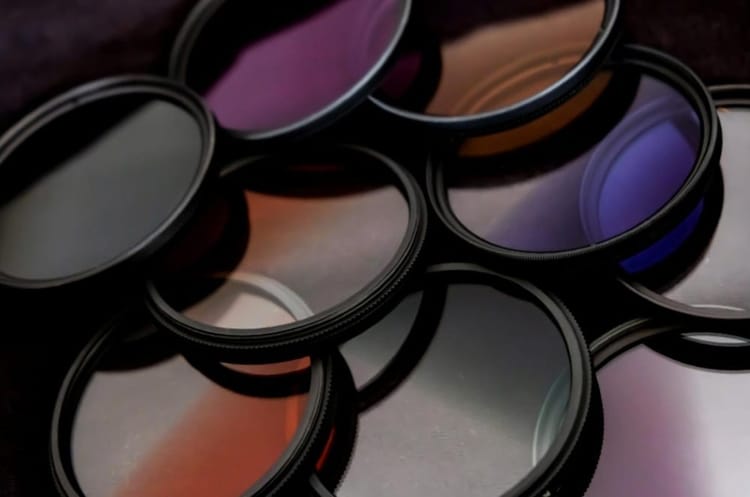Photography and Mental Health: A Creative Outlet

1. Introduction
Understanding the Connection Between Photography and Mental Health
Photography and mental health are intricately linked, offering a unique avenue for emotional expression and psychological well-being. Engaging in photography allows individuals to capture moments that resonate with their inner experiences, facilitating a deeper understanding of their emotions. This creative process can serve as a therapeutic outlet, enabling people to process complex feelings and reduce stress.
The act of taking photographs encourages mindfulness, drawing attention to the present moment and fostering a sense of presence. This mindful engagement can alleviate symptoms of anxiety and depression by shifting focus away from negative thought patterns. Moreover, photography provides a platform for self-expression, allowing individuals to communicate aspects of their identity and experiences that may be difficult to articulate verbally.
Incorporating photography into one's routine can lead to increased self-esteem and confidence. Successfully capturing meaningful images instills a sense of accomplishment and purpose, reinforcing positive self-perception. Additionally, sharing photographs with others can enhance social connections, fostering a sense of community and support.
Understanding the connection between photography and mental health reveals how this art form can be a powerful tool for enhancing psychological well-being. By embracing photography as a means of self-expression and mindfulness, individuals can cultivate resilience and a deeper appreciation for the world around them.
Affiliate Disclaimer
This blog post may include links to affiliate sites. If you click on an affiliate link and make a purchase, we may earn a small commission or receive other compensation at no extra cost to you. Please note that many of the links on our site are affiliate links. Our use of these links does not impact the products, services, or websites we recommend to you. This disclaimer covers all forms of communication with you, including our website, email, phone, social media, products, and other platforms.
2. The Therapeutic Benefits of Photography
Photography offers a range of therapeutic benefits that can significantly enhance mental well-being. Engaging in this creative activity provides an avenue for self-expression, mindfulness, and personal growth, all of which contribute positively to mental health.
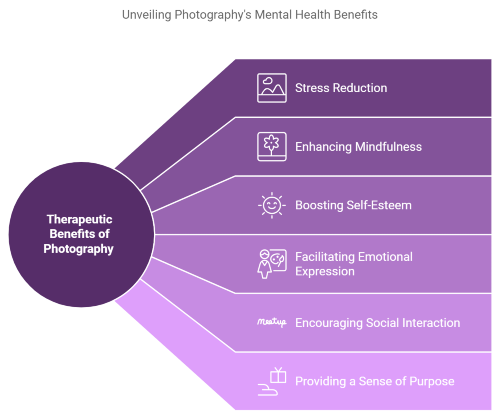
2.1 Stress Reduction Through Creative Expression
Engaging in photography allows individuals to channel their emotions and thoughts into visual form, serving as a constructive outlet for stress relief. The process of capturing images encourages focus and immersion in the task, diverting attention from daily pressures and anxieties. This creative engagement can lead to a sense of accomplishment and relaxation, thereby reducing overall stress levels.
2.2 Enhancing Mindfulness and Presence
Photography naturally fosters mindfulness by requiring individuals to be present and attentive to their surroundings. The act of composing a shot involves observing details, light, and composition, which cultivates a heightened awareness of the present moment. This mindful practice can alleviate symptoms of anxiety and depression by grounding individuals in the here and now, promoting a sense of calm and clarity.

2.3 Boosting Self-Esteem and Confidence
The process of creating and sharing photographs can enhance self-esteem and confidence. Receiving positive feedback and recognition for one's work reinforces a sense of competence and self-worth. Additionally, photography provides a means to explore and express one's identity, leading to greater self-understanding and acceptance.
2.4 Facilitating Emotional Expression and Processing
Photography serves as a medium for expressing complex emotions that may be difficult to articulate verbally. Through imagery, individuals can convey feelings such as joy, sorrow, or confusion, facilitating emotional release and processing. This form of expression can be particularly beneficial for those who find traditional verbal communication challenging.
2.5 Encouraging Social Interaction and Connection
Participating in photography can lead to increased social interaction through group projects, exhibitions, or online communities. Sharing one's work and engaging with others' photography fosters a sense of community and belonging. These social connections are vital for mental health, providing support networks and reducing feelings of isolation.
2.6 Providing a Sense of Purpose and Achievement
Setting photography-related goals, such as completing a project or mastering a new technique, provides individuals with a sense of purpose. Achieving these goals fosters a feeling of accomplishment and motivation, which are essential components of mental well-being.
Incorporating photography into one's routine can lead to significant improvements in mental health. By offering avenues for creative expression, mindfulness, and social connection, photography serves as a valuable tool in promoting overall psychological well-being.
3. Photography as a Tool for Emotional Expression
Photography serves as a powerful medium for conveying emotions, offering individuals a unique avenue to express feelings that may be challenging to articulate verbally. This form of creative expression plays a significant role in the intersection of photography and mental health, providing therapeutic benefits through visual storytelling.
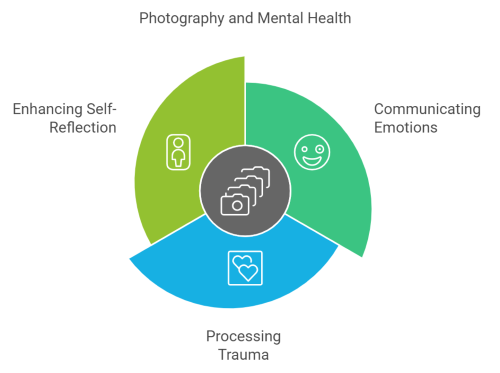
3.1 Communicating Emotions Through Imagery
Engaging in photography allows individuals to externalize their internal experiences, capturing emotions such as joy, sorrow, or confusion in a tangible form. By translating feelings into images, photographers can process and understand their emotions more deeply. This practice not only fosters self-awareness but also facilitates emotional release, contributing positively to mental health. As noted by Earth Endeavours, photography enables the conveyance of complex emotions and thoughts that might be challenging to articulate, serving as a powerful outlet for creative expression and emotional release.
3.2 Processing Trauma and Personal Experiences
For individuals who have experienced trauma, photography offers a means to navigate and make sense of their experiences. Through the creation of images that reflect their journey, individuals can confront and process traumatic memories in a controlled and therapeutic manner. This process aids in healing and fosters resilience, highlighting the profound connection between photography and mental health. The School of Photography emphasizes that photography provides a therapeutic outlet, allowing individuals to process trauma, explore their identity, and communicate feelings that might be difficult to put into words.
3.3 Enhancing Self-Reflection and Personal Growth
The practice of photography encourages self-reflection, prompting individuals to explore their perspectives and experiences. By analyzing their work, photographers can gain insights into their emotional states and thought processes, facilitating personal growth and self-discovery. This introspection is a vital component of mental well-being, underscoring the therapeutic potential of photography. As highlighted by The Social Talks, photography engages the brain in a unique and profound way, promoting self-reflection and personal growth.
Incorporating photography into therapeutic practices can significantly enhance emotional expression and processing. By providing a visual language for emotions, photography serves as a valuable tool in promoting mental health and emotional well-being.
4. Social Benefits of Photography
Photography not only serves as a medium for personal expression but also fosters social connections, which are vital for mental well-being. Engaging in photography can lead to meaningful interactions and a sense of community, thereby enhancing one's social life and mental health.
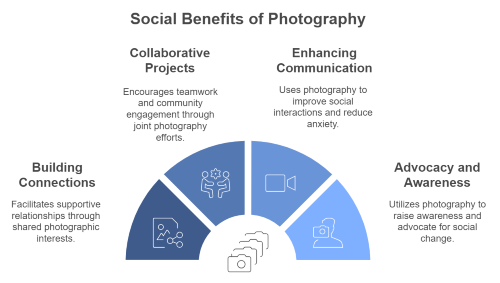
4.1 Building Connections Through Shared Interests
Participating in photography groups or clubs allows individuals to connect with others who share similar interests. These interactions can lead to the formation of supportive relationships, reducing feelings of isolation and loneliness. For instance, the Pinehouse Photography Club in Saskatchewan engages youth experiencing mental health issues, providing them with a sense of community and belonging.
4.2 Collaborative Projects and Community Engagement
Collaborative photography projects encourage teamwork and community involvement. Working together on exhibitions or group assignments fosters a sense of purpose and collective achievement. Such activities not only enhance social skills but also contribute to improved mental health by promoting a sense of belonging and accomplishment. The Las Fotos Project in Los Angeles, for example, guides young Latine teens to use photography for creative expression and self-understanding, fostering healthier relationships with social media and enhancing community engagement.
4.3 Enhancing Communication Skills
Photography can serve as a conversational catalyst, making it easier for individuals, especially those with social anxiety, to engage with others. Approaching someone for a portrait or discussing photographic techniques can initiate meaningful conversations, thereby improving social interaction and reducing anxiety. As noted by Daphne Brislin, photography can be a terrific icebreaker, helping individuals overcome social anxiety and build confidence in social settings.
4.4 Providing a Platform for Advocacy and Awareness
Photography can be a powerful tool for raising awareness about social issues, allowing individuals to contribute to their communities meaningfully. By capturing and sharing images that tell compelling stories, photographers can advocate for change and foster a sense of purpose, which is beneficial for mental health. The One Project, for instance, uses therapeutic photography to help individuals express and overcome depression and anxiety, thereby promoting mental well-being.
Incorporating photography into one's social activities can lead to enhanced interpersonal relationships and a stronger sense of community. These social benefits play a crucial role in the relationship between photography and mental health, offering avenues for connection, communication, and communal engagement.
5. Incorporating Photography into Daily Life for Mental Well-being
Integrating photography into daily routines can significantly enhance mental health by fostering mindfulness, encouraging creative expression, and promoting a deeper connection with one's surroundings. Establishing a regular photography practice and exploring nature through the lens are effective strategies to achieve these benefits.
5.1 Establishing a Routine Photography Practice
Developing a consistent photography habit encourages individuals to engage with their environment intentionally, promoting mindfulness and reducing stress. By dedicating time each day or week to capture images, individuals can create a structured activity that provides a sense of purpose and accomplishment. This regular engagement not only enhances technical skills but also serves as a therapeutic outlet for self-expression.
Incorporating photography into one's routine can lead to increased self-esteem and confidence. Successfully capturing meaningful images instills a sense of accomplishment and purpose, reinforcing positive self-perception. Additionally, sharing photographs with others can enhance social connections, fostering a sense of community and support.

5.2 Exploring Nature Through the Lens
Combining photography with nature exploration amplifies mental health benefits. Engaging in nature photography encourages individuals to spend time outdoors, which has been linked to improved mood and reduced stress levels. The process of capturing natural scenes fosters a sense of awe and appreciation for the environment, promoting positive emotions and mental well-being.
Research indicates that exposure to natural environments can lead to cognitive benefits, such as improved attention and memory. By immersing oneself in nature photography, individuals can experience these cognitive enhancements while also engaging in a fulfilling creative activity.
Incorporating photography into daily life, particularly through routine practice and nature exploration, can serve as a powerful tool for enhancing mental well-being. By fostering mindfulness, encouraging creative expression, and promoting a deeper connection with the environment, photography offers a multifaceted approach to improving mental health.
6. Conclusion
Embracing Photography as a Creative Outlet for Mental Health
Photography serves as a multifaceted tool that intertwines creativity with mental well-being. By engaging in photography, individuals can experience stress reduction, enhanced mindfulness, and improved self-esteem. The act of capturing images encourages present-moment awareness and offers a medium for expressing complex emotions, thereby fostering emotional resilience.
Moreover, photography facilitates social connections through shared interests and collaborative projects, contributing to a sense of community and belonging. Incorporating photography into daily routines, especially through exploring nature, amplifies these benefits by combining creative expression with the therapeutic effects of the natural environment.
In summary, embracing photography as a creative outlet can significantly enhance mental health by providing avenues for self-expression, mindfulness, and social engagement. By integrating photography into one's life, individuals can cultivate a deeper appreciation for their surroundings and foster overall psychological well-being.
Top 7 FAQs
- How can photography improve mental health?
- Photography encourages mindfulness, self-expression, and creativity, which can reduce stress and enhance overall mental well-being.
- Can photography help with anxiety and depression?
- Yes, engaging in photography can provide a therapeutic outlet, helping individuals process emotions and alleviate symptoms of anxiety and depression.
- Is photography used in therapy?
- Absolutely, therapeutic photography is a recognized practice where individuals use photography to explore emotions and experiences, often guided by mental health professionals.
- Do I need to be a professional photographer to benefit?
- No, anyone can benefit from photography's mental health advantages, regardless of skill level. The act of capturing images mindfully is what's beneficial.
- How does photography promote mindfulness?
- Photography requires focusing on the present moment and observing details, which cultivates mindfulness and reduces mental distractions.
- Can photography help build social connections?
- Yes, joining photography groups or sharing your work can foster social interactions, reduce feelings of isolation, and enhance mental health.
- Are there specific photography projects that aid mental health?
Engaging in personal projects, such as daily photo journals or themed shoots, can provide structure and a sense of accomplishment, boosting mental well-being.
Thank you for visiting our site and being part of this journey with us! We rely on the generous support of visitors like you to continue providing high-quality. Your donation, no matter the size, helps us maintain the website and create more valuable resources for everyone.

